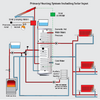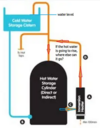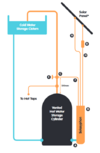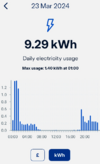I would like something energy efficient
I will read that as some thing cheaper to run, as if using a resistive heater the only way to get more efficient is a heat pump.
As
@flameport says reducing losses is the way to go, better lagging.
My boiler is 19 kW and it will turn off in summer after ½ hour basic reason is the heat can not transfer fast enough, to heat 40 gallons with a 3 kW immersion heater will take around 4 hours and will need around 12 kWh so 3 into 12 goes 4 so around 4 hours to fully heat the tank, the problem is an immersion heater normally does not heat whole tank, it only heats the top, and the main land UK method was to fit two immersion heaters, one going to near bottom of tank, and the other just the top. The bottom one used before having a bath.
In Ulster they have another method, the Irish are very clever, they fit the immersion outside the main tank and it is arranged to heat water from the top down, so the longer it is left on, the more hot water you get, called the Willis system, the big question is if a main land plumber has the skill to set this up? However with the Willis system having a timer on the immersion will control how much hot water you have rather than how hot the water is.
I have tried to get more info on the Willis as not sure how it will work when the immersion is not using 3 kW, mine uses a variable amount of power, depending on how much solar is being produced.
I have used a power shower (name given to an electrical pumped shower) and it was very good, however not permitted to suck water from the mains, so need an open vented system to use one, and a hot and cold water supply. There are other methods to get higher pressure hot water, including a hot coil supply. This

shows the idea, the cylinder is not pressurised to mains pressure, but DHW is, the other method is to pressurise whole cylinder but this then requires an annual pressure test.
Much depends on how much hot water you use, and how it compares with other electric use. Now I have a smart meter I can have a split tariff, so I was paying 62.21p standing charge, and 29.57p per kWh now I pay 59.14p standing charge, and 31.31p per kWh in the day, and 8.95p per kWh from midnight until 8 am.
One needs to know what you use and when to work out which is best for you, what makes it pay for me, is I have a 3.2 kWh battery which is charged over night, and solar panels to keep the power use down during the day. You can clearly heat the DHW over night, so for DHW alone the split tariff would save money, but it is what power is used by other items.
Use a timer on the immersion cylinder, so it's ready when you need it?
This is clearly the way to go with a split tariff, but with a single tariff, not so sure, if I heat my cylinder with the oil central heating it can heat whole tank, and it will last us 3 days, it has no tank thermostat, and there are losses from the pipe work, so the boiler in summer was run for ½ hour every other day, but after fitting solar panels I went over to using an immersion heater which does have a tank thermostat, and is supplied from an iboost+ so only uses spare solar energy, and once the unit had switched off reporting tank hot, the water would not last until the next day, as it only heats around the top 9" of water.
This shows B and C the two immersion heater positions so one can select how much is heated, and this

shows the Willis system, with external immersion heater

but the big question is if it's all worth it? I paid a lot for my solar panels and battery, and I am not sure it they will ever pay for them selves, my electric payments have gone down from £119.70 to £81.35 a month direct debit, that may not be the real change in how much I use, but £460.20 a year it will take 26 years to pay back, that will make me 99 years old before it pays for its self.
We were banking on electric prices raising, but I did not take into account loss of interest. And there is a notice on my electric app to say prices are going down in April. I have redone my calculations based on what my in house display shows and it does seem saving may be a £100 more per year to what British Gas worked out, however it seems it will not pay for its self in the 7 years promised.
I look at power used, and there are some heavy power users which can be run when electric cost is low, washing machine, tumble drier, dish washer etc. and running them over night while also reheating water could reduce electric costs, but google tumble drier fire and we see

so many reports, as to how many involve heat pump driers I don't know, but there are clearly risks in running appliances unattended over night.
So a full tank (40 gallons) of water peak cost is around £4, this will likely last around 3 days. With all the timers etc one may reduce the cost to £1.20 if heated over night, so saving is around 90 p a day, heating over night, but one would also need to uses other items over night as well to compensate for extra cost of electric during the day. I think a heat pump drier is far less likely to go on fire to an element type, however we are still looking at the whole safety aspect of running items over night.







